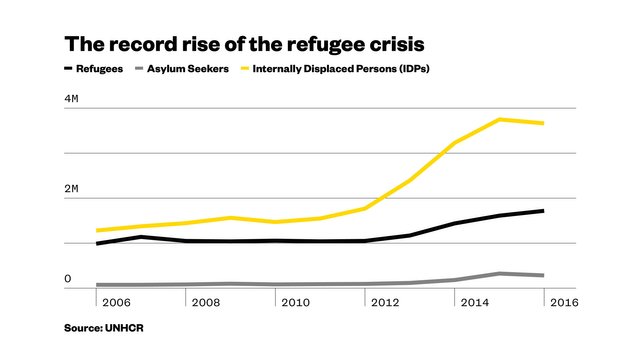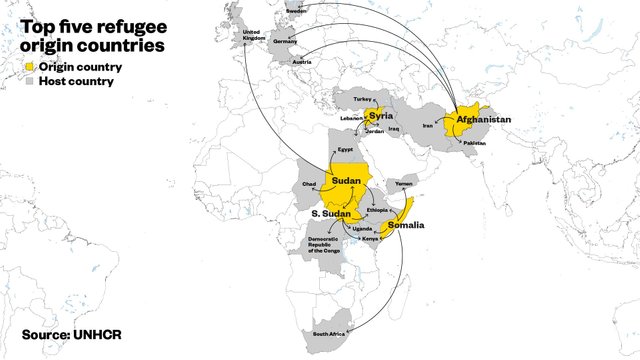
Nearly two years have passed since the image of a lifeless 2-year-old, Alan Kurdi, washed up on a Turkish shore horrified the world, waking it to a surging refugee crisis that had gone largely unnoticed. There’s been a litany of policy debates and elections since, but mostly just stifling inaction.
In fact, the refugee crisis has hit record numbers and shows little sign of improvement or hope for the most vulnerable populations in the world.
On World Refugee Day, an annual event meant to shine a light on the growing global refugee crisis and the plight of the refugee, VICE News simply laid out the U.N.’s latest, unsparing statistics.
65.6 million
That’s the number of people who were forcibly displaced from their homes in 2016, including refugees, internally displaced persons (IDPs), stateless persons, returnees, and asylum seekers.
Put simply: There has never been a worse refugee crisis.
22.5 million are refugees, 40.3 million are internally displaced persons, and 2.8 million are asylum seekers.

22.5 million
That’s the number of refugees in the world today, an increase of more than 58 percent from 10 years ago. There have never been more refugees at any one time in recorded history.
Over 17.1 million refugees are recognized under UNHCR and an additional 5.3 million under UNRWA, the agency specifically dedicated to providing relief to Palestinian refugees in the aftermath of the 1948 Arab-Israeli war.
The surge in refugees is a result of the rise in violence and conflict worldwide. While the Syrian civil war played a dominant role in the statistics, emerging conflicts in sub-Saharan Africa also contributed significantly.

“Exile is one of the defining issues of our times, not only because millions have had to flee their homes but also because refugees, regrettably, have become a crucial political issue.” – United Nations High Commissioner for Refugees Filippo Grandi in a speech at the UN in February 2017.
51
That’s the percentage of all refugees in 2016 who were children, many of whom were from Afghanistan, South Sudan, or Syria.
TOP 5 ORIGIN COUNTRIES
- Syria
- Afghanistan
- South Sudan
- Somalia
- Sudan
TOP 5 HOST COUNTRIES:
- Turkey
- Pakistan
- Lebanon
- Iran
- Uganda

Developing regions handled the lion’s share of the world’s refugee crisis in 2016, hosting 84 percent of refugees under the UNHCR. Three of the top refugee-hosting countries — the Democratic Republic of the Congo, Ethiopia, and Uganda — are formally considered the world’s least developed countries by the U.N.’s Human Development Index.
And it’s only getting more dangerous…
More refugees died trying to get to these countries in 2016 than ever before.
1 in 47
That’s the odds of a refugee dying on their journey from the northern coast of Africa to Italy, also known as the Central Mediterranean route. In 2016, over 181,000 migrants or refugees fled from Libya, Eritrea, Somalia, Nigeria, and other war-torn African countries to reach Europe.
1 in 88
That’s the odds of a refugee dying on their journey across the Eastern Mediterranean to Europe, typically used by Syrians, Afghans, and Somalis trying to reach Greece as an entry point into Europe.
PUBLIC ATTITUDE AMONG THE RICHEST COUNTRIES IN THE WORLD
United States
A majority of U.S. registered voters (54 percent) said the U.S. didn’t have a responsibility to accept Syrian refugees, according to a Pew Research poll. Opinions are divided on bipartisan lines. 87 percent of Trump supporters believed that the U.S. didn’t have a responsibility to accept Syrian refugees, compared to 27 percent of Clinton supporters.
European Union
Europeans have a widespread opposition to further migration and in large part have begun to disagree with the responsibility of hosting. Respondents to a Chatham House poll, when asked whether “All further migration from mainly Muslim countries should be stopped,” overwhelmingly said yes — 71 percent in Poland, 65 percent in Austria, and 64 percent in Belgium. In Germany, a mere 19 percent disagreed with the statement. No country had more than 32 percent disagree.
GET INVOLVED
There are hundreds of international organizations working every day to help the vulnerable refugee population. Reach out to organizations such as IRC, UNICEF, or Doctors Without Borders (MSF) to find out how to donate and get involved.
By Alexa Liautaud on Jun 20, 2017

Hi! I am a robot. I just upvoted you! I found similar content that readers might be interested in:
https://news.vice.com/story/there-are-more-refugees-today-than-ever-before
Downvoting a post can decrease pending rewards and make it less visible. Common reasons:
Submit
The refugee crisis... one of the hardest and most inhumane crises today. It's horrific to see people die trying to achieve a better future -- and I deeply appreciate any organization trying to help these desperate souls to find a better life. Nobody deserves to die looking for happiness.
Downvoting a post can decrease pending rewards and make it less visible. Common reasons:
Submit
I believe STEEM can play a role in helping these people. The STEEM blockchain can help give these people fair access to financial tools as well as provide them with an education. It can aid them in learning their local languages and even help teach people English on a global scale. The STEEM blockchain can empower people on a global scale. If done right, we can truly change the world for the better. I see a bright future of sharing economy / decentralized everything.
Downvoting a post can decrease pending rewards and make it less visible. Common reasons:
Submit
It is an unfortunate set of circumstances that I see here everyday with these defenseless souls trying to find a place where they are not subjected to any type of aggression or inhumane treatment. Unfortunately the list of charities you mention do very little on the ground to aid them...as the host countries simply do not want the headache of processing them. The sure is for the super powers to stop using these peoples homes as a playing field for military games and control of commodities. The mentality of "protecting our country" does not mean dropping billions of dollars of munitions on defenseless human beings. But then again it does create a multi billion dollar industry of supply and demand doesn't it. It is so easy to put a label on who is responsible, but of course that is a sensitive subject that those powers will have to live with for eternity.
Downvoting a post can decrease pending rewards and make it less visible. Common reasons:
Submit